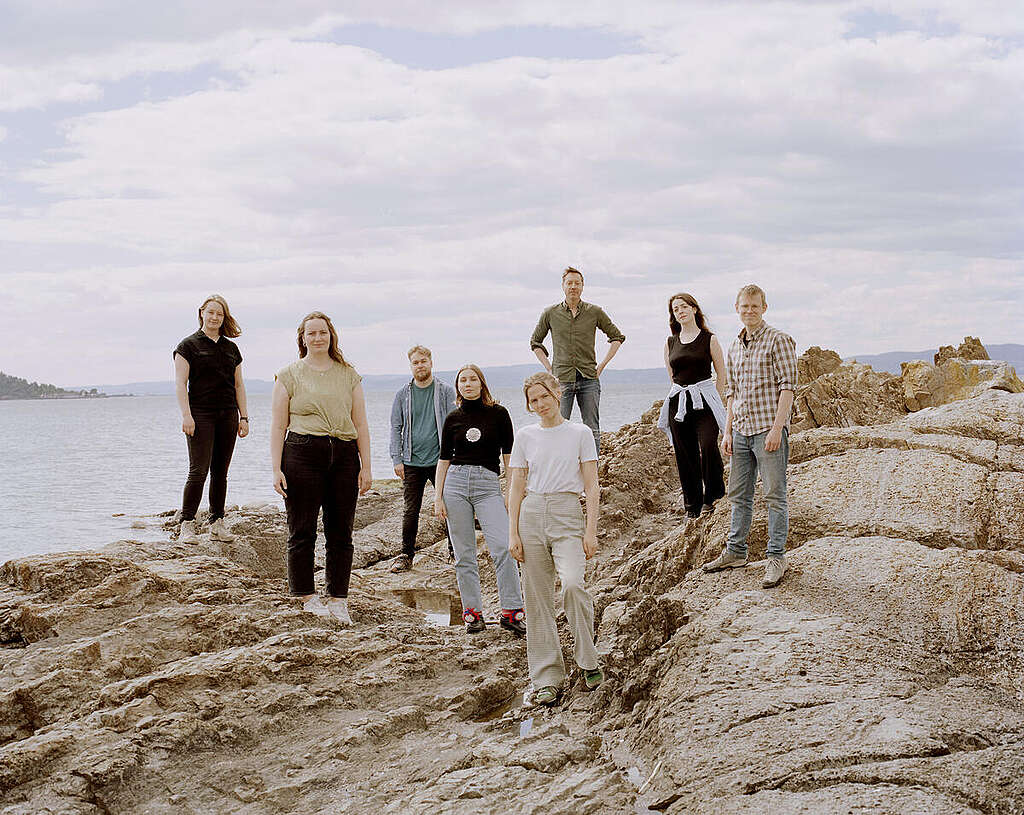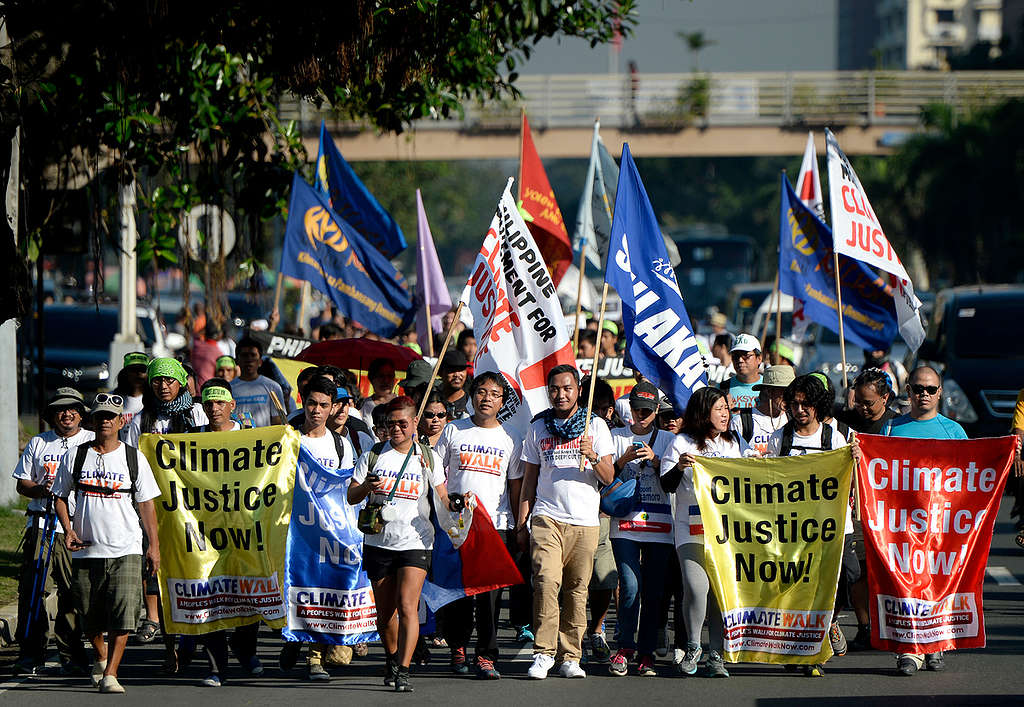The Greenpeace Nordic case, together with six youth activists and Natur og Ungdom (Nature and Youth), at the European Court of Human Rights (ECtHR) is more than a legal battle; it is a critical moment for the climate justice movement around the world. In our case we challenge the Norwegian government's decision to expand oil and gas extraction in the Arctic in the midst of the climate crisis. We argue that these actions violate fundamental human rights.
Following the herstoric KlimaSeniorinnen win by a group of Swiss senior women who brought the first ever climate case before the ECtHR, the Court has invited the parties, including six young activists together with environmental organisations Nature & Youth and Greenpeace Nordic, to submit additional arguments by 16 August.
There will likely be no oral hearing and no date has been set for the ruling, but, as the climate activists involved, we're hoping for a prompt and favourable resolution.

Here's why we're feeling optimistic
The climate litigation movement has made significant advances globally. We've seen a growing number of climate lawsuits forcing states and corporations to take more ambitious climate action to protect human rights and the environment.
We've seen how climate-impacted communities bringing their stories to the courts is a powerful way to encourage a green and just transition away from fossil fuels, secure more robust environmental policies, and strengthen international cooperation on climate issues.
We also celebrated a landmark win in the Oslo District Court this year where the Norwegian government's approvals for three new oil and gas fields were ruled invalid because it failed to conduct adequate climate impact assessments.
Against this backdrop, we are optimistic for a judgement ordering our country, Norway, to take all necessary measures to protect human rights in the context of climate change, including stopping the expansion of fossil fuel extraction and production that prioritises greed over need.
This case could take us all one step closer to climate justice
The case against the Norwegian state highlights the connection between environmental protection and human rights in the context of ongoing oil and gas exploration.
Bringing our case to the ECtHR underscores the point that climate change is not just an environmental issue but a human rights issue. In April this year, the Court found for the first time ever that a State's climate inaction violates human rights.
We argue that the Norwegian government's continued expansion of oil drilling in the Arctic exacerbates climate change, thereby infringing on our right to life and right to private and family life for present and future generations, as protected under Articles 2 and 8 of the European Convention on Human Rights (ECHR).
A favourable ruling would reinforce protection of the right to a clean, healthy and sustainable environment as a precondition for the enjoyment of basic human rights while demonstrating clearly that aggressive oil policies are a threat to these rights.

Climate justice is justice for Indigenous Peoples
Indigenous Peoples are disproportionately affected by the climate crisis and are involved in pursuing climate justice cases on multiple continents.
In Norway and other parts of Europe the Sámi people's traditional way of life and livelihoods are already severely threatened by climate change. Members of Indigenous Sámi communities and people of Sámi descent are among the applicants in the Norwegian climate justice case. They, and the other youth applicants, argue that the State's plans to intensify emissions discriminate against youth and Indigenous Peoples, violating Article 14 of the ECHR.
"That the European Court of Human Rights soon will hear our case is a watershed moment for us who have been fighting Norwegian oil for years," says Ella Marie Hætta Isaksen, Sámi activist and one of the young applicants.
"I hope a victory will force Norway onto a new course," says Ella, "as the Norwegian government's aggressive oil expansion continues to put dirty oil profits above human rights. My people, the indigenous people of Norway, Sweden, Finland and Russia, have survived countless hardships. If world leaders don't act now to prevent further climate and environmental destruction, it is the Indigenous Peoples around the world who will be among the very first to lose their livelihoods. That is why this matter is so incredibly important to me."
Why this ruling matters
To tackle the climate crisis, governments must stop granting licences to extract, process, transport, and burn fossil fuels that wreak havoc on the environment. Instead, data shows a surge in new oil and gas exploration in 2024, with just five wealthy countries accounting for 56% of oil and gas licences since 2000 – Norway being one of them.
This is a landmark case because it's the ECtHR's first opportunity to rule on obligations for combustion emissions. 95% of the emissions from Norway's massive oil and gas industry stem from the combustion of exported oil and gas. The ECtHR ruled in the KlimaSeniorinnen case that the State's primary duty is to "adopt, and to effectively apply in practice, regulations and measures capable of mitigating the existing and potentially irreversible, future effects of climate change." The Applicants argue that Norway's licensing plans will have the opposite effect.
For Norway, a country with an aggressively expansion-driven oil and gas policy, this ruling could compel the State to take necessary and appropriate measures to protect human rights and keep global temperature increase below 1.5ºC, by foregoing the expansion of fossil fuel projects. This could lead the government to reassess its licensing policies and invest more in renewable energy sources to meet its human rights obligations.
A critical moment for climate justice
"We are very excited about the human rights Court's upcoming ruling. It will mark the first time one of the world's highest courts will examine the effects of climate-wrecking fossil fuel expansion on fundamental human rights. An outcome in favour of the climate and our human rights will establish a legal precedent and have positive repercussions for Norway, Europe and beyond," says Klimentina Radkova, legal campaigner at Greenpeace Nordic.
The ECtHR has the potential to reinforce the imperative of States to take necessary and sufficient measures to safeguard human rights and the rights of the future generations and Indigenous Peoples in the context of the climate crisis. As we await the Court's decision, the efforts of the young activists and impacted communities remind us of the urgency and importance of this fight for a sustainable, equitable and just future.
It's time for all of us to assert our rights, demand climate justice, and a dignified way of life.
Juni Haugan Holden is Communications Officer for Greenpeace Norway







